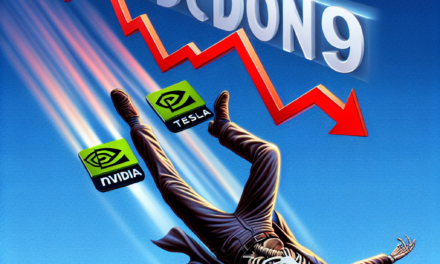“Moderna’s Market Moves: Vaccine Worries Trim Stock Targets”
Introduction
Moderna Inc., a prominent biotechnology company known for its mRNA-based COVID-19 vaccine, has recently faced a downward revision in its stock price target by several financial analysts. This adjustment comes amid growing concerns over the company’s vaccine sales projections and potential challenges in maintaining its market share as the pandemic evolves. Factors contributing to this reassessment include increased competition from other vaccine manufacturers, uncertainties surrounding booster shot demand, and potential regulatory hurdles. These elements have prompted a reevaluation of Moderna’s future revenue streams, impacting investor sentiment and leading to a recalibration of its stock valuation.
Impact Of Vaccine Efficacy Concerns On Moderna’s Stock Price
Moderna, a prominent player in the biotechnology sector, has recently faced a significant challenge as concerns over the efficacy of its COVID-19 vaccine have emerged. These concerns have led to a downward revision of the company’s stock price target, reflecting the potential impact on its financial performance and market position. The revision comes amid a broader context of evolving scientific data and competitive pressures within the pharmaceutical industry. As investors and analysts reassess Moderna’s future prospects, the company’s stock has experienced increased volatility, underscoring the intricate relationship between scientific developments and market dynamics.
The initial optimism surrounding Moderna’s mRNA-based COVID-19 vaccine was driven by its high efficacy rates and the urgent global demand for effective vaccines. However, as the pandemic has progressed, new variants of the virus have emerged, raising questions about the long-term efficacy of existing vaccines. In particular, the rise of variants with mutations that may partially evade immune responses has prompted scientists and public health officials to re-evaluate the protective capabilities of current vaccines. This scientific uncertainty has inevitably influenced investor sentiment, leading to a reassessment of Moderna’s stock valuation.
Moreover, the competitive landscape in the vaccine market has intensified, with several pharmaceutical companies developing and distributing their own COVID-19 vaccines. This increased competition has put pressure on Moderna to maintain its market share and continue innovating to address emerging challenges. As a result, any perceived shortcomings in vaccine efficacy can have a pronounced impact on the company’s stock price, as investors weigh the potential for reduced revenue and market competitiveness.
In response to these concerns, Moderna has been actively working on developing updated versions of its vaccine to target specific variants. The company’s commitment to innovation and adaptability is crucial in maintaining investor confidence and ensuring its long-term success. However, the timeline for regulatory approval and distribution of these updated vaccines remains uncertain, adding another layer of complexity to the stock price evaluation.
Furthermore, the broader economic environment and investor sentiment towards the biotechnology sector also play a role in shaping Moderna’s stock performance. As the global economy continues to recover from the pandemic, shifts in investor focus towards other sectors may influence the demand for biotechnology stocks. Additionally, regulatory scrutiny and public perception of vaccine safety and efficacy can further impact investor confidence, highlighting the multifaceted nature of stock price determinants.
In light of these factors, analysts have adjusted their price targets for Moderna’s stock, reflecting a more cautious outlook on the company’s near-term financial performance. While the long-term potential of mRNA technology remains promising, the immediate challenges posed by vaccine efficacy concerns necessitate a reevaluation of Moderna’s market position. Investors are closely monitoring the company’s efforts to address these challenges and adapt to the evolving landscape, as the outcome will significantly influence Moderna’s stock trajectory.
In conclusion, the recent cut in Moderna’s stock price target underscores the complex interplay between scientific developments, market competition, and investor sentiment. As the company navigates these challenges, its ability to innovate and respond to emerging threats will be critical in shaping its future prospects. While uncertainties remain, Moderna’s commitment to addressing vaccine efficacy concerns and maintaining its competitive edge will be pivotal in determining its long-term success in the biotechnology sector.
Analyzing The Market Reaction To Moderna’s Revised Stock Price Target
In recent developments, the pharmaceutical giant Moderna has faced a significant revision in its stock price target, primarily due to emerging concerns surrounding its vaccine portfolio. This adjustment has sparked a wave of reactions across the market, prompting investors and analysts to reassess their positions and expectations. Understanding the implications of this revised target requires a comprehensive analysis of the factors contributing to the decision and the broader market dynamics at play.
To begin with, the primary catalyst for the downward revision of Moderna’s stock price target is the growing uncertainty regarding the long-term demand for COVID-19 vaccines. As the pandemic evolves, the global vaccination landscape is shifting, with many countries achieving high vaccination rates and moving towards booster campaigns. However, the initial urgency that drove unprecedented demand for vaccines is waning, leading to questions about the sustainability of revenue streams from this segment. Consequently, analysts have adjusted their forecasts to reflect a more tempered outlook on future vaccine sales, directly impacting Moderna’s stock valuation.
Moreover, competition within the pharmaceutical industry has intensified, with several companies developing and distributing their own COVID-19 vaccines. This increased competition has not only affected market share but also put pressure on pricing strategies. As a result, Moderna faces the challenge of maintaining its competitive edge while navigating a more crowded marketplace. The company’s ability to innovate and diversify its product offerings will be crucial in determining its future financial performance and, by extension, its stock price.
In addition to these industry-specific factors, broader economic conditions have also played a role in shaping market perceptions of Moderna’s stock. Inflationary pressures, fluctuating interest rates, and geopolitical tensions have contributed to a volatile investment environment. Investors are increasingly cautious, seeking stability and resilience in their portfolios. In this context, any perceived vulnerabilities in a company’s business model or revenue projections can lead to swift adjustments in stock price targets.
Transitioning to the market’s reaction, the revised stock price target has elicited a mixed response from investors. Some view it as a prudent recalibration, aligning expectations with the evolving realities of the vaccine market. Others, however, perceive it as a signal of potential challenges ahead, prompting a more cautious approach to investing in Moderna. This divergence in perspectives underscores the complexity of the current market environment, where sentiment can shift rapidly based on new information and analyses.
Furthermore, the impact of the revised stock price target extends beyond Moderna itself, influencing the broader pharmaceutical sector. As one of the leading players in the COVID-19 vaccine space, Moderna’s performance is often seen as a bellwether for the industry. Consequently, changes in its stock valuation can have ripple effects, affecting investor sentiment towards other companies with similar business models or market exposure.
In conclusion, the reduction in Moderna’s stock price target due to vaccine concerns highlights the intricate interplay of factors influencing market dynamics. From shifting demand patterns and increased competition to broader economic conditions, a multitude of elements contribute to shaping investor perceptions and decisions. As the situation continues to evolve, stakeholders will closely monitor Moderna’s strategic responses and their implications for the company’s long-term prospects. Ultimately, navigating this complex landscape will require a nuanced understanding of both industry-specific trends and macroeconomic forces.
Investor Sentiment: How Vaccine Concerns Are Shaping Moderna’s Future
Investor sentiment plays a crucial role in shaping the future of any company, and Moderna is no exception. Recently, concerns surrounding the efficacy and demand for its COVID-19 vaccines have led to a downward revision of its stock price target by several analysts. This development has sparked discussions among investors and market observers about the potential implications for Moderna’s long-term growth prospects. As the world continues to grapple with the ongoing pandemic, the pharmaceutical industry remains under intense scrutiny, with companies like Moderna at the forefront of vaccine development and distribution.
The initial optimism surrounding Moderna’s mRNA technology and its role in combating COVID-19 contributed to a significant surge in its stock price. However, as the pandemic evolves, so too do the challenges faced by vaccine manufacturers. One of the primary concerns affecting Moderna’s stock price is the emergence of new COVID-19 variants, which may potentially reduce the effectiveness of existing vaccines. This has led to questions about the company’s ability to adapt its vaccine formulations quickly enough to address these variants, thereby maintaining its competitive edge in the market.
Moreover, the global vaccination landscape is shifting, with many countries achieving high vaccination rates and moving towards booster campaigns. This transition has raised concerns about the future demand for Moderna’s vaccines, particularly in regions where the pandemic is perceived to be under control. Consequently, analysts have adjusted their expectations for Moderna’s revenue growth, leading to a reassessment of its stock price target. In addition, the competitive landscape is becoming increasingly crowded, with other pharmaceutical companies developing and distributing their own vaccines. This intensifying competition poses a challenge for Moderna, as it must continue to innovate and differentiate its products to maintain market share.
Furthermore, regulatory scrutiny remains a significant factor influencing investor sentiment. As Moderna seeks to expand its vaccine offerings and explore new therapeutic areas, it must navigate a complex regulatory environment. Any delays or setbacks in obtaining approvals for new products could impact the company’s financial performance and, by extension, its stock price. Investors are keenly aware of these risks and are closely monitoring Moderna’s progress in addressing them.
Despite these challenges, it is important to recognize that Moderna has made significant strides in advancing its mRNA technology platform. The company’s efforts to develop vaccines for other infectious diseases, as well as its exploration of mRNA-based therapies for cancer and rare diseases, demonstrate its commitment to innovation and diversification. These initiatives have the potential to drive future growth and create new revenue streams, which could positively influence investor sentiment over the long term.
In conclusion, while concerns about vaccine efficacy and demand have led to a reduction in Moderna’s stock price target, the company’s future remains promising. The evolving nature of the pandemic and the competitive landscape present both challenges and opportunities for Moderna. As the company continues to navigate these complexities, investor sentiment will likely be shaped by its ability to adapt and innovate. Ultimately, Moderna’s success will depend on its capacity to leverage its mRNA technology platform to address current and future healthcare needs, thereby securing its position as a leader in the pharmaceutical industry.
Moderna’s Strategic Response To Stock Price Target Adjustments

Moderna, a prominent player in the biotechnology sector, has recently faced a significant adjustment in its stock price target, primarily due to emerging concerns surrounding its vaccine portfolio. This development has prompted a strategic response from the company, aimed at addressing investor apprehensions and reinforcing its market position. The adjustment in Moderna’s stock price target reflects a broader sentiment in the market, where investors are increasingly cautious about the long-term sustainability of vaccine-driven revenues. As the initial surge in demand for COVID-19 vaccines begins to stabilize, questions have arisen regarding the company’s ability to maintain its growth trajectory. In response, Moderna has embarked on a multifaceted strategy to reassure stakeholders and adapt to the evolving landscape.
To begin with, Moderna is intensifying its efforts in research and development to diversify its product pipeline. Recognizing the need to reduce reliance on COVID-19 vaccines, the company is channeling resources into the development of vaccines for other infectious diseases, as well as exploring therapeutic applications of its mRNA technology. This strategic pivot not only aims to mitigate the risks associated with a single-product focus but also positions Moderna to capitalize on emerging opportunities in the broader healthcare market. Furthermore, Moderna is actively engaging with regulatory bodies and healthcare authorities to ensure the continued relevance and efficacy of its COVID-19 vaccines. By conducting ongoing studies and trials, the company seeks to address concerns related to vaccine efficacy against new variants and the duration of immunity. This proactive approach is designed to instill confidence in both the public and investors, underscoring Moderna’s commitment to scientific rigor and public health.
In addition to its scientific endeavors, Moderna is also focusing on strategic partnerships and collaborations. By joining forces with other industry leaders and research institutions, the company aims to leverage collective expertise and resources to accelerate innovation. These partnerships not only enhance Moderna’s research capabilities but also provide access to new markets and distribution channels, thereby bolstering its competitive edge. Moreover, Moderna is taking steps to optimize its operational efficiency and cost structure. By streamlining manufacturing processes and investing in advanced technologies, the company seeks to enhance its production capacity and reduce costs. This operational agility is crucial in maintaining profitability, especially as the market dynamics shift and competition intensifies.
While Moderna’s strategic response is comprehensive, it is not without challenges. The biotechnology sector is inherently unpredictable, with regulatory hurdles, scientific uncertainties, and market volatility posing ongoing risks. Nevertheless, Moderna’s proactive measures demonstrate a clear commitment to navigating these complexities and sustaining its growth momentum. In conclusion, the recent adjustment in Moderna’s stock price target serves as a catalyst for the company to reassess and refine its strategic priorities. By diversifying its product pipeline, engaging in strategic partnerships, and optimizing operational efficiency, Moderna is positioning itself to address investor concerns and capitalize on future opportunities. As the company continues to adapt to the evolving landscape, its strategic response will be pivotal in shaping its trajectory and reinforcing its standing in the biotechnology sector. Through these concerted efforts, Moderna aims to not only weather the current challenges but also emerge stronger and more resilient in the face of future uncertainties.
The Role Of Vaccine Safety In Moderna’s Stock Valuation
In recent months, Moderna has faced a series of challenges that have led to a reassessment of its stock valuation, particularly in light of concerns surrounding vaccine safety. As a leading biotechnology company, Moderna has been at the forefront of developing mRNA technology, which has played a crucial role in combating the COVID-19 pandemic. However, the evolving landscape of vaccine safety and efficacy has prompted analysts to reevaluate the company’s financial outlook, resulting in a downward revision of its stock price target.
To understand the impact of vaccine safety on Moderna’s stock valuation, it is essential to consider the broader context of the pharmaceutical industry. Vaccine safety is a critical factor that influences public trust and acceptance, which in turn affects demand and market performance. Any concerns regarding adverse effects or long-term safety can lead to hesitancy among the public, potentially reducing the uptake of vaccines. This, consequently, can have a direct impact on a company’s revenue and profitability, as seen in the case of Moderna.
Moreover, the competitive landscape in the vaccine market has intensified, with several companies developing and distributing their own COVID-19 vaccines. This increased competition has put pressure on Moderna to maintain its market share while ensuring the highest standards of safety and efficacy. As new data emerges and regulatory bodies continue to monitor vaccine performance, any negative findings can lead to swift market reactions, affecting stock prices.
In addition to these external factors, internal challenges have also played a role in shaping Moderna’s stock valuation. The company has been working diligently to address any safety concerns and improve its vaccine formulations. However, the process of conducting thorough research and obtaining regulatory approvals is time-consuming and costly. These efforts, while necessary, can strain financial resources and impact short-term profitability, further influencing stock price targets.
Furthermore, investor sentiment is heavily influenced by public perception and media coverage. In an era where information is rapidly disseminated, any reports of vaccine-related issues can lead to heightened scrutiny and speculation. This can create volatility in the stock market, as investors react to both confirmed data and rumors. Moderna, like other pharmaceutical companies, must navigate this complex environment, balancing transparency with the need to protect proprietary information.
Despite these challenges, it is important to recognize the significant contributions Moderna has made to public health. The company’s innovative approach to vaccine development has saved countless lives and demonstrated the potential of mRNA technology. As Moderna continues to refine its products and expand its pipeline, there remains potential for growth and recovery in its stock valuation.
In conclusion, the role of vaccine safety in Moderna’s stock valuation is multifaceted, involving a combination of public perception, regulatory scrutiny, and market dynamics. While recent concerns have led to a reduction in the company’s stock price target, it is crucial to consider the broader context and the ongoing efforts to address these challenges. As the situation evolves, Moderna’s ability to adapt and innovate will be key to restoring investor confidence and achieving long-term success.
Comparing Moderna’s Stock Performance With Other Vaccine Manufacturers
In recent months, Moderna has faced a series of challenges that have led to a reassessment of its stock price targets by various financial analysts. These challenges primarily stem from concerns about the long-term demand for its COVID-19 vaccines, as well as the competitive landscape in which it operates. As a result, Moderna’s stock performance has been under scrutiny, especially when compared to other vaccine manufacturers such as Pfizer and Johnson & Johnson. Understanding the dynamics of this comparison requires a closer look at the factors influencing Moderna’s market position and how it stacks up against its competitors.
To begin with, Moderna’s initial success was largely driven by its pioneering mRNA technology, which allowed for rapid development and deployment of its COVID-19 vaccine. This innovation propelled the company into the spotlight and resulted in a significant surge in its stock price. However, as the pandemic has evolved, so too have the market conditions. The global vaccination drive has reached a point where supply is beginning to outpace demand, particularly in developed countries. This shift has raised questions about the sustainability of Moderna’s revenue streams, especially as booster shots and new variants become focal points of public health strategies.
In contrast, Pfizer, another major player in the vaccine market, has managed to maintain a more stable stock performance. This stability can be attributed to its diversified portfolio, which includes not only vaccines but also a wide range of pharmaceutical products. Pfizer’s strategic partnerships and its ability to adapt to changing market needs have allowed it to weather the fluctuations in vaccine demand more effectively than Moderna. Furthermore, Pfizer’s recent advancements in antiviral treatments for COVID-19 have provided an additional revenue stream, further bolstering investor confidence.
Similarly, Johnson & Johnson, despite facing its own set of challenges, has demonstrated resilience in the market. The company’s single-dose vaccine offered a unique value proposition during the initial phases of the vaccination campaign, and its broad pharmaceutical and consumer health portfolio has provided a buffer against the volatility experienced by companies solely focused on COVID-19 vaccines. Johnson & Johnson’s ability to leverage its established global presence and brand reputation has also played a crucial role in maintaining investor trust.
As analysts continue to adjust their price targets for Moderna, it is essential to consider the broader context of the vaccine market. The emergence of new variants and the potential need for updated vaccines present both challenges and opportunities for manufacturers. Moderna’s ongoing research and development efforts, particularly in expanding its mRNA technology to other therapeutic areas, could potentially offset some of the current concerns. However, the competitive pressure from companies like Pfizer and Johnson & Johnson, which have more diversified business models, remains a significant factor in shaping investor sentiment.
In conclusion, while Moderna’s stock price target has been cut due to vaccine concerns, the company’s future performance will largely depend on its ability to navigate the evolving landscape of the pharmaceutical industry. By comparing Moderna’s stock performance with that of other vaccine manufacturers, it becomes evident that diversification and adaptability are key elements in sustaining long-term growth. As the world continues to grapple with the implications of the pandemic, the strategies employed by these companies will undoubtedly influence their market positions and investor perceptions in the years to come.
Long-term Implications Of Vaccine Concerns On Moderna’s Market Position
Moderna, a prominent player in the biotechnology sector, has recently faced a significant challenge as analysts have adjusted their stock price targets downward due to emerging concerns about its vaccine portfolio. This development has sparked discussions about the long-term implications for Moderna’s market position, particularly in the context of its reliance on vaccine sales as a primary revenue stream. As the company navigates these challenges, it is crucial to examine the factors contributing to this shift in market perception and the potential strategies Moderna might employ to maintain its competitive edge.
To begin with, the reduction in Moderna’s stock price target is largely attributed to uncertainties surrounding the demand for COVID-19 vaccines. As the pandemic evolves, the global vaccination landscape is undergoing significant changes. With a substantial portion of the population already vaccinated and the emergence of new variants, the demand for booster shots and updated vaccines is becoming increasingly unpredictable. This uncertainty has led analysts to reassess the long-term revenue potential of Moderna’s COVID-19 vaccine, which has been a cornerstone of the company’s financial success over the past few years.
Moreover, the competitive landscape in the vaccine market is intensifying. Other pharmaceutical giants, such as Pfizer and Johnson & Johnson, are also vying for a share of the market, each bringing their own innovations and strategic partnerships to the table. This heightened competition places additional pressure on Moderna to differentiate its offerings and sustain its market share. Consequently, the company must explore avenues beyond COVID-19 vaccines to ensure sustained growth and profitability.
In light of these challenges, Moderna is likely to focus on diversifying its product pipeline. The company has already made strides in this direction by investing in research and development for vaccines targeting other infectious diseases, such as influenza and respiratory syncytial virus (RSV). By broadening its portfolio, Moderna aims to mitigate the risks associated with over-reliance on a single product line. This strategic shift not only addresses immediate concerns but also positions the company for long-term success in the broader vaccine market.
Furthermore, Moderna’s commitment to innovation and technological advancement remains a key asset. The company’s pioneering work in messenger RNA (mRNA) technology has set a new standard in vaccine development, offering a platform that can be adapted to address various infectious diseases. By leveraging this technology, Moderna has the potential to develop new vaccines more rapidly and efficiently, thereby maintaining its competitive advantage in the industry.
In addition to product diversification and technological innovation, strategic partnerships and collaborations will play a crucial role in Moderna’s efforts to solidify its market position. By forming alliances with other biotech firms, research institutions, and government agencies, Moderna can enhance its research capabilities, expand its market reach, and share the financial risks associated with vaccine development. These partnerships can also facilitate access to new markets and populations, further bolstering the company’s growth prospects.
In conclusion, while the recent reduction in Moderna’s stock price target reflects current uncertainties in the vaccine market, it also underscores the need for the company to adapt and evolve. By diversifying its product offerings, leveraging its mRNA technology, and pursuing strategic partnerships, Moderna can navigate these challenges and secure its position as a leader in the biotechnology sector. As the company continues to innovate and expand its horizons, it remains well-positioned to address the evolving needs of global healthcare and sustain its growth trajectory in the years to come.
Q&A
1. **What prompted the Moderna stock price target cut?**
Concerns over the demand and uptake of Moderna’s COVID-19 vaccines, particularly in the face of evolving pandemic dynamics and competition, prompted the stock price target cut.
2. **Which financial institutions have cut their price targets for Moderna?**
Several financial institutions, including major banks and investment firms, have adjusted their price targets, though specific names may vary based on the latest reports.
3. **How have vaccine concerns affected Moderna’s stock performance?**
Vaccine concerns have led to increased volatility in Moderna’s stock performance, with potential declines in stock value as investors reassess future revenue projections.
4. **What are the specific concerns regarding Moderna’s vaccines?**
Concerns include potential decreases in demand for booster shots, competition from other vaccine manufacturers, and uncertainties about long-term vaccine efficacy.
5. **How has Moderna responded to these concerns?**
Moderna has focused on advancing its pipeline of other mRNA-based therapeutics and vaccines, as well as adapting its COVID-19 vaccine to address emerging variants.
6. **What impact do these concerns have on Moderna’s future growth prospects?**
These concerns may impact Moderna’s short-term revenue from COVID-19 vaccines, but the company’s broader mRNA technology platform could support long-term growth.
7. **Are there any positive factors that could offset the negative impact on Moderna’s stock?**
Positive factors include the potential success of Moderna’s non-COVID-19 pipeline, ongoing research and development efforts, and strategic partnerships or acquisitions.
Conclusion
Moderna’s stock price target has been reduced due to concerns surrounding its vaccine, reflecting potential challenges in market demand, regulatory scrutiny, or competitive pressures. This adjustment indicates that analysts foresee potential headwinds for the company’s financial performance, possibly stemming from evolving public health dynamics, vaccine efficacy issues, or shifts in the competitive landscape. Investors may need to reassess their expectations for Moderna’s growth and profitability in light of these concerns, which could impact the company’s valuation and market position in the pharmaceutical industry.





